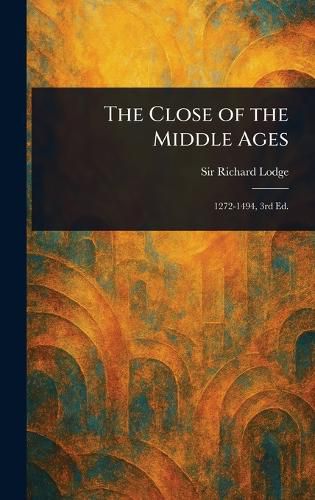Readings Newsletter
Become a Readings Member to make your shopping experience even easier.
Sign in or sign up for free!
You’re not far away from qualifying for FREE standard shipping within Australia
You’ve qualified for FREE standard shipping within Australia
The cart is loading…






This title is printed to order. This book may have been self-published. If so, we cannot guarantee the quality of the content. In the main most books will have gone through the editing process however some may not. We therefore suggest that you be aware of this before ordering this book. If in doubt check either the author or publisher’s details as we are unable to accept any returns unless they are faulty. Please contact us if you have any questions.
"The Close of the Middle Ages, 1272-1494" by R. Lodge offers a detailed exploration of European history during a pivotal period of transition. This meticulously prepared edition delves into the 13th and 14th centuries, examining the forces that shaped the shift from the medieval world towards the Renaissance. Lodge's work provides insight into the political, social, and cultural landscape of the era, covering key events and developments across Europe. Readers interested in Medieval history and the broader sweep of European history will find this volume an invaluable resource. It sheds light on the complexities of this transformative age, offering a comprehensive overview of the period leading up to the Renaissance. This historical text explores the nuances of the Middle Ages, providing a rich understanding of this critical time in history.
This work has been selected by scholars as being culturally important, and is part of the knowledge base of civilization as we know it.
This work is in the public domain in the United States of America, and possibly other nations. Within the United States, you may freely copy and distribute this work, as no entity (individual or corporate) has a copyright on the body of the work.
Scholars believe, and we concur, that this work is important enough to be preserved, reproduced, and made generally available to the public. We appreciate your support of the preservation process, and thank you for being an important part of keeping this knowledge alive and relevant.
$9.00 standard shipping within Australia
FREE standard shipping within Australia for orders over $100.00
Express & International shipping calculated at checkout
Stock availability can be subject to change without notice. We recommend calling the shop or contacting our online team to check availability of low stock items. Please see our Shopping Online page for more details.
This title is printed to order. This book may have been self-published. If so, we cannot guarantee the quality of the content. In the main most books will have gone through the editing process however some may not. We therefore suggest that you be aware of this before ordering this book. If in doubt check either the author or publisher’s details as we are unable to accept any returns unless they are faulty. Please contact us if you have any questions.
"The Close of the Middle Ages, 1272-1494" by R. Lodge offers a detailed exploration of European history during a pivotal period of transition. This meticulously prepared edition delves into the 13th and 14th centuries, examining the forces that shaped the shift from the medieval world towards the Renaissance. Lodge's work provides insight into the political, social, and cultural landscape of the era, covering key events and developments across Europe. Readers interested in Medieval history and the broader sweep of European history will find this volume an invaluable resource. It sheds light on the complexities of this transformative age, offering a comprehensive overview of the period leading up to the Renaissance. This historical text explores the nuances of the Middle Ages, providing a rich understanding of this critical time in history.
This work has been selected by scholars as being culturally important, and is part of the knowledge base of civilization as we know it.
This work is in the public domain in the United States of America, and possibly other nations. Within the United States, you may freely copy and distribute this work, as no entity (individual or corporate) has a copyright on the body of the work.
Scholars believe, and we concur, that this work is important enough to be preserved, reproduced, and made generally available to the public. We appreciate your support of the preservation process, and thank you for being an important part of keeping this knowledge alive and relevant.